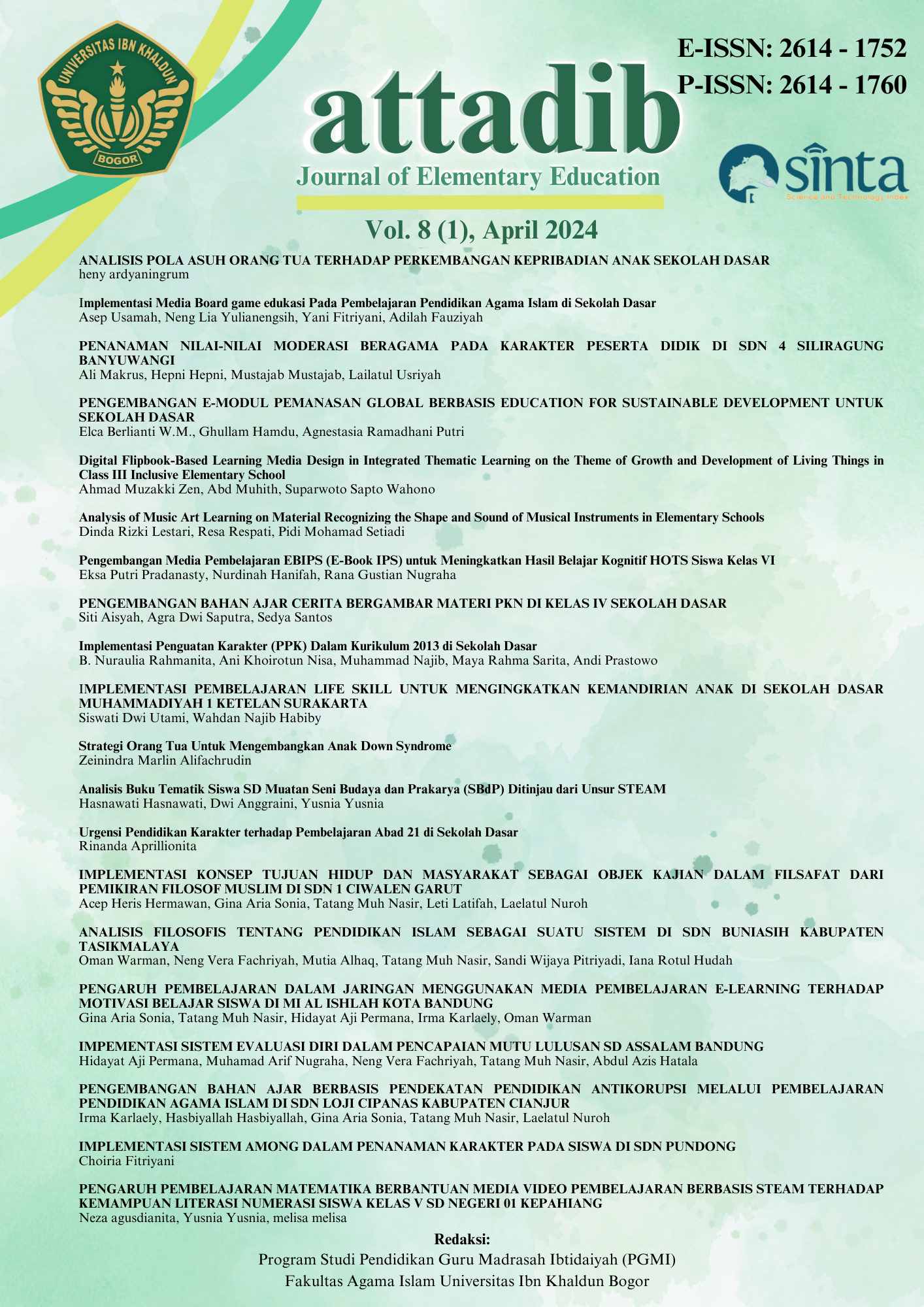THE RIPPLE EFFECT OF WORK FAMILY CONFLICT: EXAMINING PARENTING STRESS IN DUAL-EARNER FAMILIES WITH SCHOOL-AGED CHILDREN
DOI:
https://doi.org/10.32832/at-tadib.v8i3.19422Keywords:
Work-family conflict, Parenting stress, Dual-earner families, Work interference with family, Family interference with work, Cross-relationshipAbstract
Balancing work and family life is a significant challenge for dual-earner families, particular-ly for parents with elementary school-aged children. This study investigates the cross-relationship between work-family conflict (WIF and FIW) experienced by husbands and par-enting stress experienced by wives in dual-earner families. Utilizing a quantitative survey de-sign, data were collected from 246 dual-earner couples with school-aged children. The find-ings reveal that WIF experienced by husbands significantly increases the parenting stress of wives, while FIW experienced by husbands does not show a significant effect. These results highlight the importance of considering the interactive dynamics within dual-earner families and the need for supportive measures to mitigate the negative impacts of work-family conflict on overall family well-being.
References
Abidin, R. R. (1990). Introduction to the special issues: The parenting stress. Journal of Clinical Child Psychology Psychology, 19(4), 313–328.
https://doi.org/10.1207/s15374424jccp1904
Allen, T. D., Johnson, R. C., Kiburz, K. M., & Shockley, K. M. (2013). Work-Family Conflict and Flexible Work Arrangements: Deconstructing Flexibility. Personnel Psychology, 66(2), 345–376. https://doi.org/10.1111/peps.12012
Bianchi, S. M., & Milkie, M. A. (2010). Work and family research in the first decade of the 21st century. In Journal of Marriage and Family (Vol. 72, Issue 3, pp. 705–725). https://doi.org/10.1111/j.1741-3737.2010.00726.x.
Bilodeau, J., Quesnel-Vallée, A., & Poder, T. (2023). Work stressors, work-family conflict, parents' depressive symptoms and perceived parental concern for their children's mental health during COVID-19 in Canada: a cross-sectional analysis. BMC public health, 23(1), 2181. https://doi.org/10.1186/s12889-023-17037-0
Chen, Z., & Hou, L. (2021). An Actor-Partner Interdependence Model of Work Challenge Stressors and Work-Family Outcomes: the Moderating Roles of Dual-Career Couples’ Stress Mindsets. Journal of Business and Psychology, 36, 1109–1123.
https://doi.org/10.1007/s10869-020-09724-1/Published
Crain, T. L., Hammer, L. B., Bodner, T., Kossek, E. E., Moen, P., Lilienthal, R., & Buxton,
O. M. (2014). Work-family conflict, family-supportive supervisor behaviors (FSSB), and sleep outcomes. Journal of Occupational Health Psychology, 19(2), 155–167. https://doi.org/10.1037/a0036010
El Nokali, N. E., Bachman, H. J., & Votruba-Drzal, E. (2010). Parent involvement and children’s academic and social development in elementary school. Child Development, 81(3), 988–1005. https://doi.org/10.1111/j.1467-8624.2010.01447.x
Greenhaus, J. H., & Beutell, N. J. (1985). Sources of Conflict between Work and Family Roles. In Source: The Academy of Management Review (Vol. 10, Issue 1). https://www.jstor.org/stable/258214
Hammer, L. B., Allen, E., & Grigsby, T. D. (1997). Work-family conflict in dual-earner couples: Within-individual and crossover effects of work and family. Journal of Vocational Behavior, 50(2), 185–203. https://doi.org/10.1006/jvbe.1996.1557
Hwang, W., & Jung, E. (2020). Unpartnered Mothers’ Work-Family Conflict and Parenting Stress: The Moderating Effects of Nonstandard Work Schedules. Journal of Family and Economic Issues, 41(1), 158–171. https://doi.org/10.1007/s10834-019-09647-x
Kumalasari, D., Gani, I. A. A., & Fourianalistyawati, E. (2022). Adaptasi dan properti psikometri Parental Stress Scale versi Bahasa Indonesia. Jurnal Psikologi Ulayat. https://doi.org/10.24854/jpu527
Langerya Rizal, G., & Fikry, Z. (2020). Relationship of Perceived Autonomy Support With Work Family Conflict in Women Teachers in Padang City.
Leong, M. S., & Juhari, R. (2022). Work vs. Family and Marital Satisfaction among Malaysian Chinese Dual-earner Couples: An Actor-Partner Interdependence Model. Psychological Thought, 15(1), 53–80. https://doi.org/10.37708/psyct.v15i1.614
Lim, Y. (2024). Parents’ work-family conflict and children’s behavioral problems: Mediating roles of parental warmth and children’s executive function difficulties. Current Psychology, 43(8), 7217–7234. https://doi.org/10.1007/s12144-023-04866-w
Milkie, M. A., & Peltola, P. (1999). Playing All the Roles: Gender and the Work-Family Balancing Act. In Source: Journal of Marriage and Family (Vol. 61, Issue 2). http://www.jstor.orgURL:http://www.jstor.org/stable/353763
Moreira, H. (2019). Work-family conflict and mindful parenting: The mediating role of parental psychopathology symptoms and parenting stress in a sample of portuguese employed parents. Frontiers in Psychology, 10. https://doi.org/10.3389/fpsyg.2019.00635
Netemeyer, R. G., Boles, J. S., & McMurrian, R. (1996). Development and validation of work–family conflict and family–work conflict scales. Journal of Applied Psychology, 81(4), 400–410. https://doi.org/10.1037/0021-9010.81.4.400
Ni, X., Zeng, Z., & Zhou, J. (2023). The effect of thriving at work on work-family conflict: the mediating role of workaholism. Frontiers in Psychology, 14. https://doi.org/10.3389/fpsyg.2023.1136470
Nomaguchi, K., & Johnson, W. (2016). Parenting Stress Among Low-Income and Working- Class Fathers: The Role of Employment. Journal of Family Issues, 37(11), 1535 – 1557. https://doi.org/10.1177/0192513X14560642
Nomaguchi, K., & Milkie, M. A. (2020). Parenthood and Well-Being: A Decade in Review.
Journal of Marriage and Family, 82(1), 198–223. https://doi.org/10.1111/jomf.12646
Ponnet, K., Wouters, E., Goedemé, T., & Mortelmans, D. (2016). Family Financial Stress, Parenting and Problem Behavior in Adolescents: An Actor-Partner Interdependence Approach. Journal of Family Issues, 37(4), 574–597.
https://doi.org/10.1177/0192513X13514409
Rizal, G. L., & Fikry, Z. (2020). Relationship of Perceived Autonomy Support With Work Family Conflict in Women Teachers in Padang City. Proceedings of the 1st Progress in Social Science, Humanities and Education Research Symposium (PSSHERS 2019). https://doi.org/10.2991/assehr.k.200824.039
Rizal, G. L., & Fikry, Z. (2023). PENGARUH WORK FAMILY CONFLICT TERHADAP
PARENTING STRESS IBU YANG BEKERJA. https://doi.org/10.24036/rapun.v13i2
Rizal, G. L., Fikry, Z., & Yasmin, M. (2023). The Effect of Spousal Support on Work-Family Conflict of Women with Dual-Career Family in Padang City (pp. 3–18). https://doi.org/10.2991/978-94-6463-212-5_2
Voydanoff, P. (2005). Toward a Conceptualization of Perceived Work-Family Fit and Balance: A Demands and Resources Approach. Journal of Marriage and Family, 67(4), 822–836.
Yang, X., Kong, X., Qian, M., Zhang, X., Li, L., Gao, S., Ning, L., & Yu, X. (2024). The effect of work-family conflict on employee well-being among physicians: the mediating role of job satisfaction and work engagement. BMC Psychology, 12(1), 530. https://doi.org/10.1186/s40359-024-02026-8
Yoo, J. (2022). Gender Role Ideology, Work–Family Conflict, Family–Work Conflict, and Marital Satisfaction Among Korean Dual-Earner Couples. Journal of Family Issues, 43(6), 1520–1535. https://doi.org/10.1177/0192513X211026966
Yucel, D., & Borgmann, L. S. (2022). Work–family conflict and depressive symptoms among dual-earner couples in Germany: A dyadic and longitudinal analysis. Social Science Research, 104(May 2021), 102684. https://doi.org/10.1016/j.ssresearch.2021.102684
























